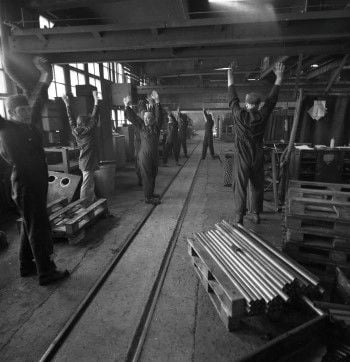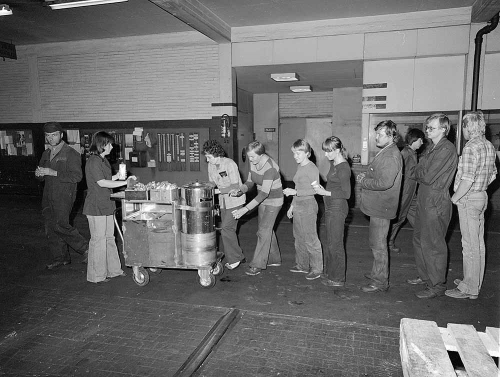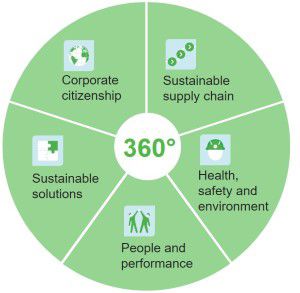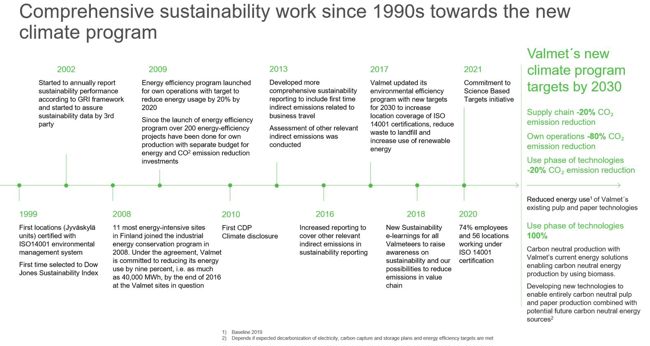Timeline for Valmet’s sustainability work
Sep 29, 2021

Sustainability has become an integral part of companies’ strategy and processes during the past 10 years. However, sustainability as a topic and as a corporate function is not a very old one.
At Valmet, sustainability is today at the core of the company’s operations and a systematic part of day-to-day work. Valmet has also earned recognition for being one of the most sustainable companies in the world by external raters.
But how has corporate sustainability evolved through the years and how did it become a core of Valmet's operations?
It all started with paying attention to safety at work and ensuring wellbeing of employees
Historically, companies’ responsibility for their employees and society began with improvements in safety at work and social conditions.
Valmet started to systematically pay special attention to these aspects particularly during the Second World War and its aftermath. Extensive residential areas were built for employees around the Rautpohja factory in Jyväskylä, Finland. An outpatient care unit laid the foundation for occupational health care. The first pension fund was established, and the company invested in employees’ well-being through sports, recreational and club activities.

Gymnastic exercises at Rautpohja works in Jyväskylä, Finland in the 1970s. Rautpohja was one of the first workplaces in Finland to offer regular and supervised break exercise.
In the 1980s and 1990s, companies operating globally started to improve energy efficiency of their manufacturing processes and developing technologies that reduced the consumption of raw materials. At Valmet, this was reflected especially in product development, where energy and raw material efficient technologies were developed in response to customers’ needs and changes in the market.

Coffee break at Rautpohja machine shop in Jyväskylä, Finland in the 1980s.
Responsibility for surrounding societies
The role of large companies in their surrounding societies was not discussed globally more extensively until the 1970s.
“The role of companies with international operations has increased significantly over the past few decades. Globally operating companies have complex value chain with suppliers, customers and production all over the world. In other words, their impact on the surrounding environment and society has increased massively, which is why their responsibility towards their impacts needed to increase accordingly,” says Laura Puustjärvi, Head of Sustainability at Valmet.
For this reason, international organizations, such as the UN, OECD, ILO and EU, are developing more extensive regulation for corporate sustainability for multinational companies. Valmet is committed to UN Sustainable Development Goals, UN Guiding Principles on Business and Human Rights, UN Global Compact initiative, OECD’s Guidelines for Multinational Enterprises, International Labor Organization’s Fundamental Principles & Conventions and Paris Agreement’s goal to limit the global warming to 1,5 degrees. Valmet’s sustainability agenda is based on these principles.
Recognition for Valmet's comprehensive sustainability work
Valmet’s Sustainability360⁰ agenda focuses on five core areas: sustainable supply chain; health, safety and the environment; sustainable solutions; people and performance; and corporate citizenship. The agenda is executed through three-year action plans.
The current sustainability agenda was launched in 2014, and this year the whole agenda will be updated with detailed action plans for 2022-2024.

Valmet’s Sustainability360⁰ agenda focuses on five core areas.
As a result of continuous improvement in more sustainable business practices, Valmet was included in the Dow Jones Sustainability Index (DJSI) for the seventh consecutive year in 2020. Valmet has also been recognized for its actions and strategy to mitigate climate change by maintaining a leadership position in CDP's climate program ranking. Valmet has received sustainability acknowledgements in other indices, too, such as S&P Global SAM’s annual Sustainability Yearbook, the Ethibel Sustainability Index (ESI) Excellence Europe and Ecovadis sustainability assessment.
“Our consistent work with sustainability has really paid off, and I have been very happy to see our employees’ commitment to integrate sustainability into our main business processes. Our “Valmet spirit” is really the reason behind our excellent results ranging from strategy to HR, product development, sales, project management and procurement. It is good to remember that the ratings and indices are only one way to look at the company’s sustainability performance through certain framework. Sustainability as a topic is so complex and comprehensive that it is hard to put it through only one funnel,” Puustjärvi says.
All the company’s functions are nowadays connected to sustainability
At the moment, it seems that the whole world's focus is on sustainability through regulatory development driven by climate change and global warming, circular economy, water scarcity, loss of biodiversity and social standards development.
There is an increasing pressure for the companies to be even more transparent in their operations.
“From the companies’ point of view all corporate functions are nowadays connected to sustainability one way or the other. At Valmet, all our functions have some processes and related actions where specific sustainability topics have been integrated. Our stakeholders are expecting to receive timely information about the progress. Especially the financial world's interest in climate-related actions has grown rapidly in the past few years. Also, the changing regulations require companies to report the sustainability of their operations more widely and comprehensively,” Puustjärvi says.
Sustainable technologies have a significant impact especially on Valmet’s customer processes.
“A customer may use Valmet’s pulp, paper or energy technologies for 10–100 years, which corresponds to 95 percent of the environmental impact of the entire value chain of the technology. For this reason, it’s important to reduce the impact of the technologies on the environmental footprint and improve safety as early as the planning phase,” says Puustjärvi.
Valmet also wants to support its suppliers to develop sustainability of their operations and to further strengthen the cooperation with them to drive more sustainable business practices.
“We work systematically to ensure responsible business practices in our global supply chain. In addition to our supplier sustainability due diligence process, we have a unique sustainability engagement program with selected suppliers, which is a forerunner in a global perspective. The program has helped the participated suppliers to make concrete improvements in their sustainability performance, and the impact is constantly growing.”
Ambitious climate program continues Valmet's comprehensive sustainability work

In 2021, Valmet introduced its climate program – Forward to a carbon neutral future, which continues the company’s comprehensive work for sustainability. The program includes ambitious CO₂ emission reduction targets and concrete actions for the whole value chain, including Valmet’s own operations, the supply chain, and the use of Valmet’s technologies by its customers.
The program is aligned with the Paris Climate Agreement’s 1.5-degree pathway and the United Nations Sustainable Development Goals. The climate program's targets have been approved by the Science Based Targets initiative.
“We believe that technology plays a key role in mitigating climate change and global warming in the transition to a carbon neutral economy. With concrete actions we will significantly reduce our own carbon footprint and support our suppliers in doing so too. Valmet is also strongly committed to be the preferred partner for our customers on their journey to carbon neutrality,” Puustjärvi says.

Timeline for Valmet's sustainability work (click to enlarge the picture)